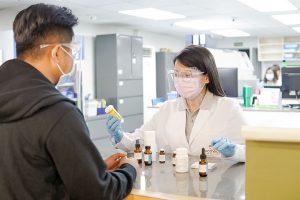THE GOVERNMENT said it is seeking to boost domestic drug manufacturing and establish a stockpile of medicine to address potential emergencies.
The Department of Health (DoH) and Food and Drug Administration (FDA) will be working with the private sector to identify medicine that can be produced domestically, the Presidential Communications Office (PCO) said in a statement late Thursday following President Ferdinand R. Marcos, Jr.’s meeting with the Private Sector Advisory Council’s (PSAC) healthcare group.
The private and public sectors will seek to boost the capacity of domestic drugmakers to increase the supply of basic medicines, including anti-tuberculosis drugs, it added.
“It was agreed on during the meeting for the PSAC to monitor new technologies in healthcare that can be used for geographically isolated and disadvantaged areas and recommend those to the DoH and PhilHealth,” the PCO said.
It said the PSAC will also study the feasibility of establishing remote diagnostics centers.
“Let’s maximize the local production. The initial reason why this came up is the supply problems that we encountered during the lockdowns so we need to be prepared. We should be able to produce the local supply of essential medicines,” Mr. Marcos was quoted as telling the PSAC by the PCO.
The Palace said the PSAC pushed for the digitalization of the Food and Drug Administration’s information systems.
“This project includes the upgrading of… the electronic certificate of the product registration information system,” it said. “The overall digitalization rate is 72.5%, and the target for full digitalization is August.”
The Palace said once digitalized, other systems such as new chemical entity renewal, certificate of listing of the identical drug product (CLIDP) and post-marketing surveillance will follow.
The Palace said Mr. Marcos also asked the Commission on Higher Education (CHED) during the meeting to “immediately” address the shortage of nurses due to migration.
CHED Chairperson Prospero de Vera III said it is currently seeking ways to bring those that did not pass the board into the workforce, adopting a nursing curriculum with exit credentials, and encouraging non-practicing nurses to return to the profession.
“Under the nursing curriculum with exit credentials, students could have several options: exit at the end of Level I or II, obtain the certificate or diploma in Nursing, or choose to continue and finish the four-year nursing program to become a registered nurse,” Mr. De Vera told the PSAC Health Sector group.
He said CHED was also working on a flexible short-term master’s program, which would address the lack of instructors in nursing and medical schools.
Acting Health Secretary Maria Rosario S. Vergeire said the DoH is also assessing the status of proposed legislation on the Magna Carta for Public Health Care Workers and Philippine Nursing Act while conducting a study on the standardization of salaries of nurses, doctors and healthcare workers.
During the meeting, a target was set to implement Universal Health Care (UHC) by 2028 by strengthening the Philippine Health Insurance Corp. (PhilHealth).
“The ultimate goal is for Filipinos to be able to take advantage of a fully-implemented universal healthcare (UHC) system by 2028,” the PSAC said in a separate statement.
The PSAC said it is engaging third-party consultants to assess the performance of the PhilHealth leadership team. — Kyle Aristophere T. Atienza
